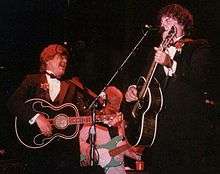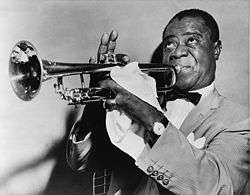List of UK Singles Chart number ones of the 1960s
| UK Singles Chart number ones |
|---|
| UK Singles Chart Official Charts Company Christmas number one |
The UK Singles Chart is the official record chart in the United Kingdom. Prior to 1969 there was no official singles chart;[1][2][3] however, The Official Charts Company and Guinness' British Hit Singles & Albums regard the canonical sources as New Musical Express (NME) before 10 March 1960 and Record Retailer from then until 15 February 1969 when Retailer and the BBC jointly commissioned the British Market Research Bureau (BMRB) to compile the charts.[1][4] The choice to use Record Retailer as the canonical source for the 1960s has been contentious because NME (which continued compiling charts beyond March 1960) had the biggest circulation of periodicals in the decade and was more widely followed.[1][2] As well as the chart compilers mentioned previously, Melody Maker, Disc and Record Mirror all compiled their own charts during the decade. Due to the lack of any official chart the BBC aggregated results from all these charts to announce its own Pick of the Pops chart.[1] One source explains that the reason for using the Record Retailer chart for the 1960s was that it was "the only chart to have as many as 50 positions for almost the entire decade".[3] The sample size of Record Retailer in the early 1960s was around 30 stores whereas NME and Melody Maker were sampling over 100 stores.[1] In 1969, the first BMRB chart was compiled using postal returns of sales logs from 250 record shops.[4]
In terms of number-one singles, The Beatles were the most successful group of the decade having seventeen singles reach the top spot.[5] The longest duration of a single at number-one was eight weeks and this was achieved on three occasions: "It's Now or Never" by Elvis Presley in 1960; "Wonderful Land" by The Shadows in 1962 and "Sugar, Sugar" by The Archies in 1969. The Beatles' song "She Loves You" became the best-selling single of all time in 1963, a record it held until 1977 when band member Paul McCartney's new band, Wings, surpassed it with "Mull of Kintyre".[6] "She Loves You" was the best-selling song of the decade and one of fourteen songs believed to have sold over one million copies in the 1960s.[7][8][9]
Number-one singles




- Key
- † – Best-selling single of the year[11][nb 1]
- ‡ – Best-selling single of the decade[11]
| Contents |
|---|
| ← 1950s · 1960 · 1961 · 1962 · 1963 · 1964 · 1965 · 1966 · 1967 · 1968 · 1969 · 1970s → |
By artist
The following artists achieved three or more number-one hits during the 1960s. Cliff Richard achieved seven number ones; two solo and five with the Shadows. The Shadows had a total of ten number ones; five solo and five with Cliff Richard.
| Artist | Number-one hits |
|---|---|
| The Beatles | 17 |
| Elvis Presley | 11 |
| The Shadows | 10 |
| The Rolling Stones | 8 |
| Cliff Richard | 7 |
| Frank Ifield | 4 |
| The Everly Brothers | 3 |
| Georgie Fame | 3 |
| Gerry and the Pacemakers | 3 |
| The Kinks | 3 |
| Roy Orbison | 3 |
| Sandie Shaw | 3 |
| The Searchers | 3 |
Million-selling and gold records
Although official music recording sales certifications were not introduced until the British Phonographic Industry was formed in 1973, Disc introduced an initiative in 1959 to present a gold record to singles that sold over one million units.[20] Information about when a record was classified gold by Disc is "not well documented".[20] The awards relied on record companies correctly compiling and supplying sales information. This could lead to errors, such as The Archies' "Sugar, Sugar" incorrectly being awarded a gold disc in January 1970.[nb 4] Such inaccuracies led to the instigation of official classifications by the BPI.[20] Nevertheless, following the introduction of music downloads in 2004, "Sugar, Sugar" passed the one-million sales mark.[21]
The Shadows instrumental, "Apache", is the first known song to being awarded Disc's gold record but it is disputed whether one million copies were sold.[nb 5] The awarding of fifteen gold records (one erroneously) is documented and, notably, five were awarded to releases by The Beatles. No song is believed to have sold one million copies after 1967 – "The Last Waltz" by Engelbert Humperdinck – and before BPI instigated its platinum record (still one million units) in 1973.[7][8][22][nb 6] Although The Righteous Brothers first released "Unchained Melody" in August 1965 it had more success after being re-released in the 1990s reaching number one and selling over million copies.[25]
| Artist | Song | Year of millionth sale[7][8][20] |
|---|---|---|
| The Shadows | "Apache" | N/A[nb 5] |
| Presley, ElvisElvis Presley | "It's Now or Never" | 1960 |
| Bilk, AckerAcker Bilk | "Stranger on the Shore" | 1961–62 |
| Richard, CliffCliff Richard and The Shadows | "The Young Ones" | 1962 |
| Ifield, FrankFrank Ifield | "I Remember You" | 1962 |
| The Beatles | "She Loves You" | 1963 |
| The Beatles | "I Want to Hold Your Hand" | 1963 |
| The Beatles | "Can't Buy Me Love" | 1964 |
| The Beatles | "I Feel Fine" | 1964 |
| Dodd, KenKen Dodd | "Tears" | 1965 |
| The Seekers | "The Carnival Is Over" | 1965 |
| The Beatles | "Day Tripper" / "We Can Work It Out" | 1965–66 |
| Jones, TomTom Jones | "Green, Green Grass of Home" | 1966 |
| Humperdinck, EngelbertEngelbert Humperdinck | "Release Me" | 1967 |
| Humperdinck, EngelbertEngelbert Humperdinck | "The Last Waltz" | 1967 |
| The Archies | "Sugar, Sugar" | 2004–10[nb 4] |
See also
- List of NME number-one singles of the 1960s
- List of Record Mirror number-one singles
- List of Mersey Beat number-one singles
- List of Fab 40 number-one singles
- List of Top Pops number-one singles
Notes
- ↑ In the 1960s three songs were the best-selling of the year but did not reach number one:
- In 1962, the best-selling song of the year was "Stranger on the Shore" by Acker Bilk which had reached number one on the Record Mirror chart.[12] On the Record Retailer chart (UK Singles Chart) the single peaked at number two in January 1962 and remained in the top 15 until July.[13][14]
- In 1964, the best-selling song of the year was "I Love You Because" by Jim Reeves which peaked at number five and remained in the top 40 from February to November 1964.[15][16]
- In 1969, the best-selling song of the year was "My Way" by Frank Sinatra which peaked at number five in May but- remained in the chart all year.[17][18]
- 1 2 3 4 5 6 7 8 9 10 11 12 13 14 15 16 17 18 19 20 21 22 23 24 25 26 27 28 29 30 31 32 33 34 35 36 37 38 39 40 The artist, song name, dates and duration are those given by The Official Charts Company.[19]
- 1 2 3 4 5 6 7 8 9 10 Due to different charts being used, the weekday varies prior to August 1969: Chart week starting Friday before 10 March 1960 (NME), Thursday before July 1967 (Record Retailer), Wednesday before August 1969, and chart week ending Saturday after that (BMRB). These are the dates by which the charts are usually referred to and so are the dates used in this table.
- 1 2 "Sugar, Sugar" was erroneously awarded a gold record by Disc having sold approximately 945,000 copies. The RCA informed Disc that one million copies had been shipped, however not all were sold.[7][8][20] The single went on to sell over a million copies with the introduction of music downloads in 2004.[21]
- 1 2 Despite being awarded a gold record (for selling one million units) by Disc,[20] other sources suggest the record did not sell one million copies.[7][8]
- ↑ The number of sales required to qualify for a platinum record was later dropped in 1989 to the current thresholds of 600,000 units.[22][23][24]
References
- 1 2 3 4 5 Smith, Alan. "50s & 60s UK Charts – The Truth!". Dave McAleer's website. Retrieved 4 November 2010.
- 1 2 Leigh, Spencer (20 February 1998). "Music: Charting the number ones that somehow got away". The Independent. Retrieved 5 August 2010.
- 1 2 Warwick, Neil; Kutner, Jon; Brown, Tony (2004). The Complete Book Of The British Charts: Singles and Albums (3rd ed.). London: Omnibus Press. p. v. ISBN 1-84449-058-0.
Until 15th February 1969, there was no officially compiled chart.
- 1 2 "Key Dates in the History of the Official UK Charts". The Official Charts Company. Archived from the original on 10 January 2008. Retrieved 16 May 2010.
- ↑ "Featured Artists: The Beatles". The Official Charts Company. Retrieved 6 August 2010.
- ↑ Leadbetter, Russell (17 May 2010). "Macca proves he’s no sellout". The Herald. Retrieved 31 May 2010.
- 1 2 3 4 5 "Stats and Facts: Million Sellers". The Official Charts Company. Archived from the original on 16 April 2008. Retrieved 19 July 2010.
- 1 2 3 4 5 "Million-Selling Singles". everyHit. Retrieved 12 June 2010.
- ↑ "BPI – Charts – 3. Top Twenty Chart Facts". British Phonographic Industry. Archived from the original on 4 June 2004. Retrieved 12 September 2010.
- ↑ "Artist Chart History: Tom Jones". The Official Charts Company. Retrieved 19 October 2010.
- 1 2 "Chart Archive – 1960s Singles". everyHit.com. Retrieved 29 July 2010.
- ↑ Smith, Alan. "Every No.1 in the 1960s is listed from all the nine different magazine charts!". Dave McAleer's website. Retrieved 4 November 2010.
- ↑ "Top 40 Official UK Singles Archive: 13th January 1962". The Official Charts Company. Retrieved 29 July 2010.
- ↑ "Chart Stats – Acker Bilk – Stranger on the Shore". ChartStats. Retrieved 29 July 2010.
- ↑ "Artists: Jim Reeves". The Official Charts Company. Retrieved 29 July 2010.
- ↑ "Chart Stats – Jim Reeves – I Love You Because". ChartStats. Retrieved 29 July 2010.
- ↑ "Artists: Frank Sinatra". The Official Charts Company. Retrieved 29 July 2010.
- ↑ "Chart Stats – Frank Sinatra – My Way". ChartStats. Retrieved 29 July 2010.
- ↑ "All The Number 1 Singles". Official Charts Company. 30 January 2015. Retrieved 10 January 2016.
- 1 2 3 4 5 6 Smith, Alan. "UK First Charts & Silver Discs". Dave McAleer's website. Retrieved 4 November 2010.
- 1 2 "Digital generation pushes the oldies into the million-sellers club". Music Week. 6 September 2010.
- 1 2 Gallup (4 February 1989). "The Top of the Pops Chart" (PDF). Record Mirror: 4. Retrieved 16 July 2010.
- ↑ "Certified Awards". British Phonographic Industry. Retrieved 7 June 2010.
- ↑ "International Certification Award levels" (PDF). International Federation of the Phonographic Industry. March 2010. p. 7. Retrieved 7 June 2010.
- ↑ "Artist Chart History: Righteous Brothers". The Official Charts Company. Retrieved 5 October 2010.
Further reading
- Davis, Sharon. Every Chart-Topper Tells a Story: The Sixties. Edinburgh: Mainstream Publishing, 1997 ISBN 1-85158-836-1 288p.
External links
| ||||||||||||||||||||||||||||||||||||||||||
